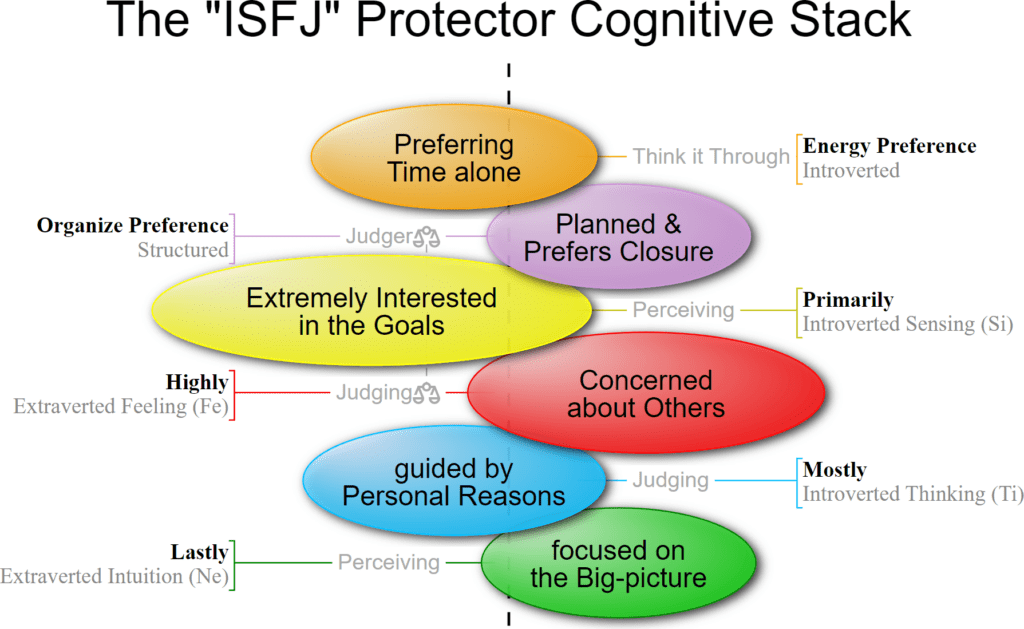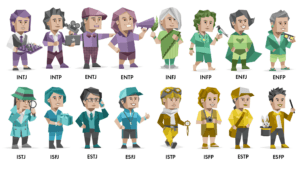What is the MBTI ISFJ “Protector” Personality Type?

People with the ISFJ Personality Type tend to be reserved, responsible, hardworking, and detail-oriented.
They are warm-hearted, friendly, considerate, and conscientious of other people’s feelings.
Protectors are down-to-earth and like to be around the same.
With Introverted Sensing as their dominant function, Protectors organize the facts and are goal-oriented.
With extraverted feeling as their top extraverted function, protectors are judges who use objective values when making decisions.

Protectors, with their introverted thinking, are guided by personal, subjective reasons. Their extraverted intuition, with its lowest function, allows them to focus more on the big picture.
Protectors are introverted, preferring time alone to think things through. They are structured, like to plan, and prefer closure.
Protectors are “Concrete Judges” with Introverted Sensing and Extraverted Feelings. When they feel threatened, they are likely to be overly apologetic about specific actions and out of touch with their overall goodness. They may also behave with the Placater Satir Communication Style.
ISFJ Personality Type cross-reference
- Keirsey Type – Protector
- Temperament Type – Melancholy
- Animal Type – Beaver
- DISC Type – Compliant
- Socio-Communicative Type – Analytical
- True Colors – Gold
- Color Code – White
- Personality Compass – East
- Occupational Type – Realistic
- Learning Type – Pragmatist
- Leadership Type – Avoider
Enneagram Types
The Enneagram is a Personality Typing System comprising nine different types.

Dominant Function – Introverted Sensing
- This function leads the introverted sensing types to focus on details and facts.
- They prefer concrete information rather than abstract theories.
- They are highly attuned to the immediate environment and firmly grounded in reality.
- Because of this tendency to focus on and protect what is familiar, they are often seen as highly traditional.
- When making decisions, they compare their vivid recall of past experiences to predict the outcome of future choices and events.
Auxiliary Function – Extraverted Feeling
- They greatly emphasize personal considerations.
- Extraverted feelers are focused on developing social harmony and connection.
- This is accomplished through behaviors viewed as socially appropriate or beneficial, such as being polite, kind, considerate, and helpful.
- They try to fulfill other people’s wants and needs, sometimes even sacrificing their own desires to ensure that others are happy.
Tertiary Function – Introverted Thinking
- They are planners and tend to be very well-organized.
- This function strengthens as people age and involves utilizing logic to understand how the world works.
- They take in new information and experiences and look for connections and commonalities to find patterns.
- Rather than simply trying to understand a small part of something, they want to see how things fit together and function as a whole.
Inferior Function – Extraverted Intuition
- While they tend to be focused on the present and concrete facts, this largely unconscious function can help balance personality by helping focus on possibilities.
- Taking in facts and exploring the “what-ifs” can lead to new insights into problems.
ISFJ Traits
ISFJs are traditional, supportive, and dutiful. They are introverted and tend to be quiet, but they are also particularly well-tuned to the emotions and feelings of others.
They have few close friends, but they are highly loyal to these friends.
The primary function is Introverted Sensing, meaning they remember data in detail and relate it to reality.
They prefer not to delegate work and hate to be treated as doormats but are too modest to display their accomplishments.
ISFJs hate conflict and will stay out of fights, as they will instead run to find an authority figure.
They prefer concrete facts over abstract theories. As a result, they tend to learn best by doing.
They tend not to be quick to change but are still adaptable. ISFJs prefer to have time to think about and prepare for significant changes. They tend to become more interested in new things when they can see and appreciate how they might solve real-world problems.
Strengths
- Reliable
- Practical
- Sensitive
- Eye for detail
Weaknesses
- Dislikes abstract concepts
- Avoids confrontation
- Dislikes change
- Neglects own needs
ISFJ Relationships
Friendships
- If you are friends with an ISFJ, you are probably already aware that they tend to be warm and selfless.
- Even though they are pretty social for introverts, they are not always good at sharing their feelings.
- Asking them how they are doing and being willing to talk can help them to open up.
- You can help be a good friend by paying attention to their needs. Take the time to see what they might need you to do for them.
Personal Relationships
- Because they are quiet, people sometimes misinterpret this as standoffish behavior.
- They are known for their compassion and caring for others. They often work to secure the safety and well-being of others without asking for thanks or anything in return.
- While they are introverts, they tend to be warm and exceptionally social.
- They are often described as kind, reliable, and trustworthy.
- Because they are hardworking and dependable and rarely seek accolades for their accomplishments, they are sometimes taken for granted by those around them.
- In some cases, people might exploit this reliability.
- They tend to have a small group of very close friends.
- While they may be quiet and reserved around people they don’t know well, they are likelier to “let loose” around these close confidants.
- They value these close friendships highly and are always willing to support and care for the people they are close to.
Partner Relationships
- They are very faithful to their partners and approach relationships with an intensity of emotion and great devotion.
- While they have strong feelings, they are not always good at expressing them.
- Your ISFJ partner may often be focused on meeting your needs, but you should reciprocate these actions.
- Showing your partner that you appreciate them can help them to feel more satisfied.
Parenting
- They are natural caregivers and are very nurturing toward their children.
- They are good at giving their kids structure and order but sometimes have difficulty enforcing discipline.
- If you are the parent of an ISFJ child, be aware of your child’s need to have time alone.
- Also, be aware that your child may be willing to give up important things to them to make other people happy.
- Please encourage them to pursue their interests and goals and remind them that meeting their needs is also essential.
ISFJ Careers
- ISFJs have several characteristics that make them well-suited to particular careers.
- Because they are attuned to others’ feelings, jobs in mental health or the healthcare industry are good fits for them.
- They are also meticulous and orderly, making them suited to jobs that involve planning, structure, or attention to detail.
- Their commitment to work, reliability, and ability to work independently make them attractive to various employers.
- Because of their solid people skills and desire to create order, they often do well in management or administrative roles.
- They excel at creating plans and helping others work together to achieve a common goal.


